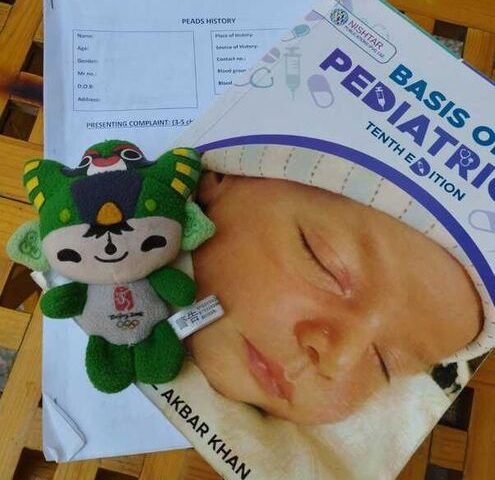
The Illusion of Time
April 6, 2022
Muslims & Geniuses: The ‘Mad’ Companions?
May 5, 2022
Through The Lens of Growth Charts, Milestones & Immunisations – A Paediatrics Rotation
Being the youngest child in the family and spending time with people who were mostly close to my age or older, dealing with infants, toddlers and children was not something I was familiar with. When family members would hand me their kids to cuddle, I’d just be standing there, holding them from their armpits till all the joints in my arms started aching! Also, the only game that pops in my head when a kid would randomly walk up to me in the middle of eating food in a wedding ceremony was ‘peek-a-boo’. After seeing my big eyes pop out during the ‘boo’, the kid would either run away or stand there expressionless, judging my soul. Hence, pediatrics seemed daunting for me even beyond academics.
I wasn’t wrong; I felt very creeped out! When I tried examining two patients around the age of 2 (a gastroenteritis and a post-op patient), I just said these words to their parents, “With your permission, I will examine your child.” Suddenly, the patients went into a never-ending crying spell. I tried to calm them down with my limited interaction experience, showing off my torch, to the extent that I tried bargaining with them to give me just 5 minutes to examine and then I would leave, but to no avail. Stranger anxiety is not a myth!
On the other hand, I was very wrong. One reason was that I’m not that bad with handling kids. I try to maintain a comfortable doctor-patient environment and the patients and their family members do interact positively, and don’t refuse me when I ask them if I, a 4th year medical student, can take the history and do the examination. Some even joke around and you could see us laughing at the top of our lungs in G1 Ward. Another reason was that it wasn’t about me; it was about them.
I’ve seen children in a whole different light now, or lens, because I’ve seen so many ways that their body failed them or was too weak to face dangers, too many ways how things could go wrong. One night, you’re passing by children on your regular walks that are smiling, laughing, giggling, and playing around, overall healthy-looking. The next morning, you’re in the hospital seeing patients with illnesses ranging from seasonal gastroenteritis to brain tumors. This was week 1 of my pediatrics rotation.
The thing about children is that they are very expressive but depending on their age, they may not have the words for it. They can’t tell you if they have a headache, nausea, palpitations, fatigue, diplopia, hearing loss, location of abdominal pain etc. Try asking a neonate or the parents in the NICU for any systemic signs (if you’re not busy being blinded by phototherapy light). You have to decipher their various emotions, expressions and presenting signs, such as being irritable and being lethargic can indicate two different things. It makes it difficult but all the more interesting.

I can’t even count how many times I’ve marked weight and height below the 5th percentile of the growth charts, how many patients came with iron deficiency anemia, gastroenteritis, seizures, asthma, chronic kidney disease, nephrotic syndrome and celiac. Many of these patients would come through Falahi OPD or lived in cities other than Islamabad and you can see from their speech and body language how such illnesses have affected their quality of life, some even moving from their hometown to Islamabad for treatment of long term illnesses:
CKD doesn’t allow children to go to school and have a normal life. One patient was brought in very late without treatment and was severely stunted and showed signs of renal osteodystrophy.
A family whose child was suspected of leukemia was immediately referred to a bone marrow transplant for an affordable bone marrow biopsy test, because they all came to Shifa on one motorbike.
Patients with neurological diseases such as
brain tumor and hydrocephalus are sometimes barely responsive to commands and
depressingly quiet (including their parents).
To have such trying illnesses in a difficult socioeconomic status is difficult
to perceive.
However, I have seen optimism during these trying times as well:
An 8 year old, who had anoxic brain injury
due to history of fall and a tracheostomy tube inserted since he was 3 years
old which led to recurrent pneumonia 2-3 times a year, would be playing with
his toy car and giggle every time his father would lovingly talk to him.
An 11 year old with Ehler Danlos syndrome had a dream of becoming District
Commissioner and teaching me Pashto, while his elder brothers who took care of
him since birth, would laugh and tease him.
A mother of a neonate, who had bilateral cleft lip and palate, was explaining to me with excitement the history behind the Haberman Feeder she would use for her baby (It was designed by a mother whose daughter was born with Pierre Robin sequence)

By the end of this rotation, I’ve learnt to be grateful to be healthy. From birth till late teens, anything can happen. Whether you’re born with a disease or whether the disease gets thrust upon you later in life due to known or unknown reasons, you never know what tomorrow will bring so in this blessed month of Ramadan, be thankful to Allah for everything that He has given you and pray to the Al-Shaafi (The Healer) to grant shifa to those patients who are yearning for the good health that you have
I’ll see you next time at the end of my next rotation, InshaAllah. Until then, give boiled water to your kids, give them a balanced diet and an occasional Mebendazole, if you please. Worms are their companions, not their friends!
Nahin Sani
MBBS, Class of 2023
